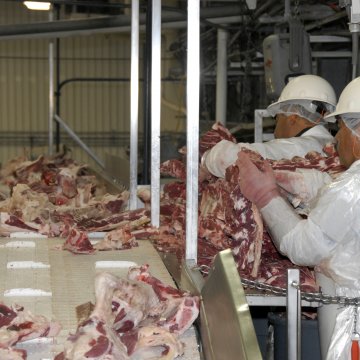BILL WOULD ADD PROTECTIONS FOR MEATPACKING WORKERS, TARGET INDUSTRY’S MONOPOLISTIC PRACTICES
A bill introduced in the Senate this week would improve working conditions and whistleblower protections for meatpacking workers, while also cracking down on monopolistic practices in the industry.
Sen. Cory Booker, a New Jersey Democrat, introduced the Protecting America’s Meatpacking Workers Act on Tuesday. In a press release, he called it a “critical piece in transforming our food system into one that is rooted in resilience, fairness, and justice.”
Rep. Ro Khanna, a California Democrat, will introduce a companion bill in the House.
Booker’s bill includes several provisions that would make meatpacking workers safer, both during routine operations and in pandemics. For example, companies could get a waiver to increase line speeds only after submitting to an inspection that demonstrated that the faster speeds would not affect worker safety. The bill would also establish stricter ergonomic standards for workers and strengthen whistleblower protections. And inspectors would have to verify that employees have prompt and proper access to toilets, without fear of punishment.
Companies would be required to establish a system for publicly reporting the number of employees who become sick during the COVID-19 pandemic and any future pandemics, along with information about their race and employment status.
The bill was crafted with input from a number of worker groups, including Venceremos, an Arkansas organization focused on the poultry sector. Magaly Licolli, the group’s executive director, said the bill reflects many of the workers’ needs and would establish a baseline of standards for the industry that worker groups could build on through organizing efforts. “It would give us leverage to pursue something better,” she said.
Workers felt “abandoned” by the Occupational Health and Safety Administration (OSHA) and other regulatory agencies when the COVID-19 pandemic hit, Licolli said. To win better protections, workers have walked off production lines and held wildcat strikes and protests outside plants.
At least 269 meatpacking workers have died so far during the COVID-19 pandemic and some 59,000 have been sickened, an investigation from the House Select Subcommittee on the Coronavirus Crisis found in October. The report blamed the companies for “prioritizing profits” and resisting worker safety measures. It also said OSHA made a “political decision” to not issue rules that would have required companies to take specific actions to protect workers from COVID-19.
While companies are rolling out vaccination programs for workers, Licolli said they are also now removing many of the safety measures put in place earlier in the pandemic, even though the crisis is far from over. “They are moving to get over the pandemic when we know there are still other variants coming,” she said.
Labor shortages are also putting workers at risk, she said, because they are often being asked to work faster and do jobs they aren’t trained to do, leading to more injuries.
The proposed legislation would also make sweeping changes in the meatpacking industry. To address consolidation, it would block smaller meat processing plants receiving certain federal grants from being sold to larger packers for a period of 10 years. It would also strengthen the Packers & Stockyards Act, reinstate mandatory country-of-origin labeling for meat, and extend the requirement to dairy.
Passing such a far-reaching suite of reforms will be difficult, given the immense political power of the meatpacking industry as well as the political polarization in Washington. But while a staffer for Sen. Booker acknowledged that it won’t be an easy fight, he said it’s part of a broader movement-building strategy to transform the food system into one that is better for workers, the environment, and consumers. So even if this bill isn’t adopted in full, parts of it might pass or be included in other legislation.
The pandemic, and its devastating effects on meatpacking workers, exposed a system in dire need of reform, said Jose Oliva, campaigns director at the HEAL Food Alliance, a coalition of groups working to change the food and farming systems. Speaking during a webinar about the bill this week, Oliva said that many of the problems the industry’s workers face — from dangerous working conditions and low wages to a lack of healthcare — aren’t new. “The pandemic didn’t change conditions, but rather unveiled existing conditions,” he said.

No comments:
Post a Comment